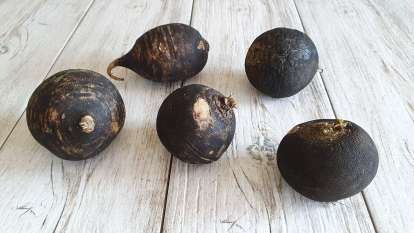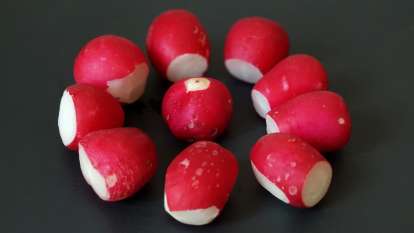Radish - a miraculous cure
Radishes are appreciated in spring and the spicy and tasty aroma is suitable for any seasonal salad. There are several varieties of radish: red moon radish, white radish or black radish. The healing qualities of radishes have long been known for treating various ailments. Radishes are recommended for the liver and stomach, they detoxifies and purifies the blood, eliminates toxins.
Radishes are simple but delicious vegetables and different varieties of radishes (white radish, red radish, black radish) have special nutritional and healing qualities. In natural medicine, radishes are used in various treatments, being useful for treating cardiovascular, gastric, respiratory problems etc.
Red radishes are recommended in the low-calorie diet.
White radish detoxifies and stimulates the oxidation process.
Well known against cough and cold treatments, black radish is also effective in case of tan and skin remedies.
Nutritional composition of radish
Radish has in its nutritional composition: pyridoxine (vitamin B6), niacin (vitamin B3), folic acid (vitamin B9), but also vitamins A, C, E and K. Low calories make it ideal in diets.
Benefits of radish
Radishes are used in a wide variety of nets and natural remedies, for the special benefits they bring to the body. If you suffer from cardiovascular, liver or kidney diseases, if you want to lose weight or have acne problems, a radish cure helps you. You can choose red moon radish, white or black radish, and the effects on your health will not be long in coming.
Radishes maintain healthy kidneys and liver
Radishes have a diuretic action and contain vitamins and minerals that keep the kidneys healthy. Urinary tract problems are alleviated by a cure with radish and fatty liver is detoxified in the amount of radish consumption. If you want to detoxify your body, spring is the perfect time to eat radishes, especially since they are low in calories and can be part of delicious salads.
Radishes reduce the risk of cardiovascular disease
Radishes are known as an adjuvant in the treatment of cardiovascular disease because they fight high cholesterol and remove impurities. Radish fights atherosclerosis and reduces deposits on blood vessels and the body works better. Anthocyanin contained in radishes prevents the hardening and inflammation of veins and arteries, preventing the formation of varicose veins.
Radish strenghtens your immune system
Radishes are very rich in vitamin C. It improves immunity and increases the number of leukocytes, reducing the risk of leukemia. Regular consumption of radish regulates the metabolism, helps to lose weight and maintain the health of the body.
Radishes fight water retention
A radish cure can help you successfully fight water retention in the body. If water is retained in the tissues then you have swollen and painful legs, favoring the development of cellulite. Radishes are rich in potassium, which eliminates excess water from the body. It adjusts sodium levels and maintains mineral balance.
Radish helps against skin problems
Cosmetics use radish to cleanse the skin, having disinfectant properties. Radish is rich in vitamin C, phosphorus and zinc, contributing to the skin's natural balance. You can make radish water by boiling to stimulate skin hydration. B-complex vitamins care and tone the skin, radish being indicated for sensitive, acne-prone skin.
The sulfur contained in radish acts against acne. You can try a mask based on radish, it is made very simple. Grate the radish on a grater, squeeze the juice and heat the remaining puree. The mask is applied on the problem areas, about 20 minutes, then rinse. Squeezed radish juice is applied to the face and left to have an effect on irritated skin with pimples. Rinse the face well and repeat the treatment periodically.
Contraindications and side effects of radish
Radish is contraindicated for those suffering from gastric ulcer, caution is recommended in pregnancy, cardiosclerosis, myocarditis, kidney failure. Sometimes the consumption of radishes generates a not very pleasant-smelling breath and gives the feeling of bloating. If you are prone to digestive disorders, it is good to eat radish with caution.
How to eat radish
Radishes are eaten raw, in salads and various garnishes, but for therapeutic purposes various radish remedies are prepared. Radish juice is administered raw, but radishes can be boiled, obtaining a radish water, if you are more sensitive to the stomach and do not tolerate raw radish. The recipe against cough includes honey and radishes.
Beneficial properties of radish:
- Diuretic;
- Antibacterial;
- Decreases the risk of cardiovascular disease;
- Maintains kidney health; Beautifies tan and skin;
- Strengthens the immune system.


Comments